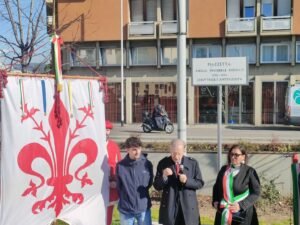A square in Florence dedicated to Amelia Pincherle, who was not only the Rosselli brothers’ mother
 Venetian by birth, Florentine by adoption, Mazzinian Jewess Amelia Pincherle Rosselli (1870-1954) was always at the side of her sons Carlo and Nello in the anti-fascist struggle that cost them their lives. Both were assassinated on June 9, 1937, in the resort town Bagnoles-de-l’Orne, by militants of the Cagoule (The Cowl), a French fascist and anti-communist group instigated by the Italian fascist regime.
Venetian by birth, Florentine by adoption, Mazzinian Jewess Amelia Pincherle Rosselli (1870-1954) was always at the side of her sons Carlo and Nello in the anti-fascist struggle that cost them their lives. Both were assassinated on June 9, 1937, in the resort town Bagnoles-de-l’Orne, by militants of the Cagoule (The Cowl), a French fascist and anti-communist group instigated by the Italian fascist regime.
Amelia Pincherle was a constant figure of reference in the political and intellectual battle waged by her sons against the fascist regime through various initiatives, among which the first antifascist paper, Non Mollare! (Don’t give up!), founded in 1925 in the Rosselli household and soon suppressed by the fascist police. “Writer and anti-fascist”: this is how Amelia Pincherle is commemorated in a plaque unveiled in the small Florentine square that now bears her name, in the immediate vicinity of the avenue named after her sons Carlo and Nello. “It seemed right to us to bring a mother closer to her children.
Amelia Pincherle Rosselli was one of the great Italians of the twentieth century,” remarked municipal Councilor for toponymy Maria Federica Giuliani at a brief ceremony in the presence of family members and descendants. The ceremony was also attended by the president of Florence Jewish Community Enrico Fink.
The petition to name the small square after Amelia Pincherle had been initiated by former Italian Environment minister Valdo Spini, now president of the Circolo Rosselli Foundation. “One could not understand the figures of the Rosselli brothers without knowing the great personality of their mother and in particular the truly Mazzinian religion of duty that she had transmitted to them,” Spini said. Her way of relating to life was helpful to them “in all the trials they had to go through for their anti-fascism,” even to the extreme consequences.
Immediately after the killing of her sons, Amelia took the reins of the family, widows and grandchildren, leading them all on a painful pilgrimage that would end in the United States, passing through Switzerland and then Great Britain (which they left because of the fear of Nazi invasion). Once the war was over, she would lead them all back to Italy.
Amelia Pincherle Rosselli, Spini recalled, was also the first woman playwright in Republican Italy and a longtime president of the literature section of the Lyceum International Club in Florence, an ancient and glorious cultural institution. By dedicating a public place to her, he concluded, “the city of Florence highlights that the contribution of women to the battle for democracy and freedom must be given due prominence.”
